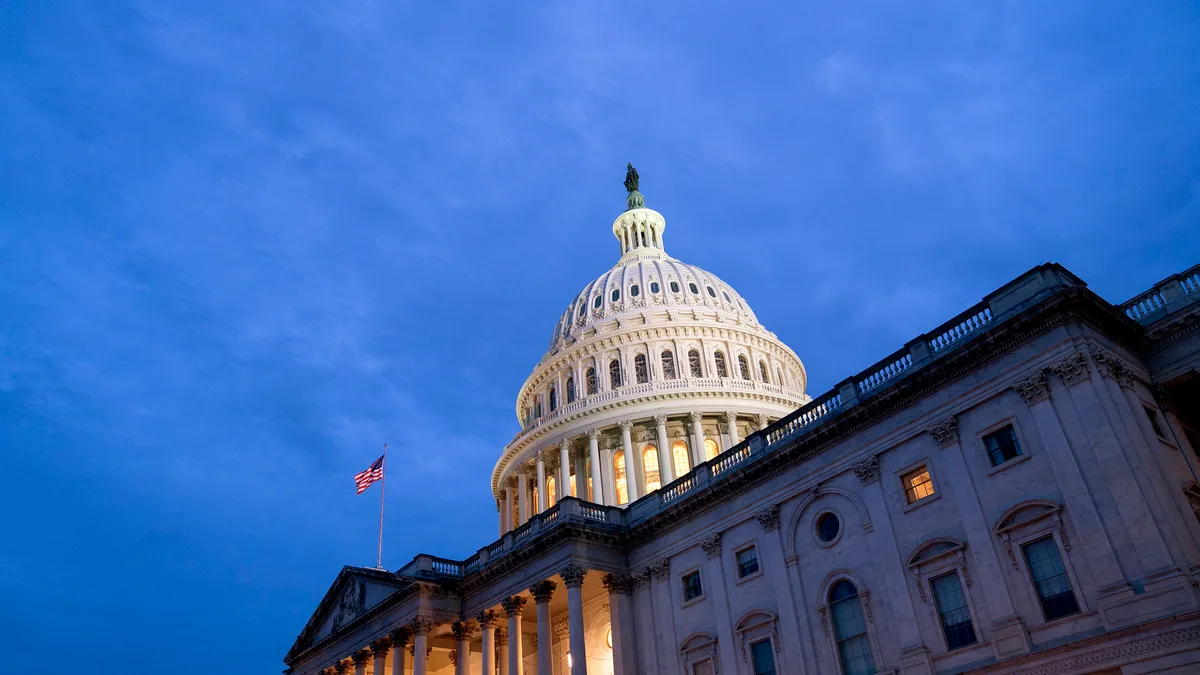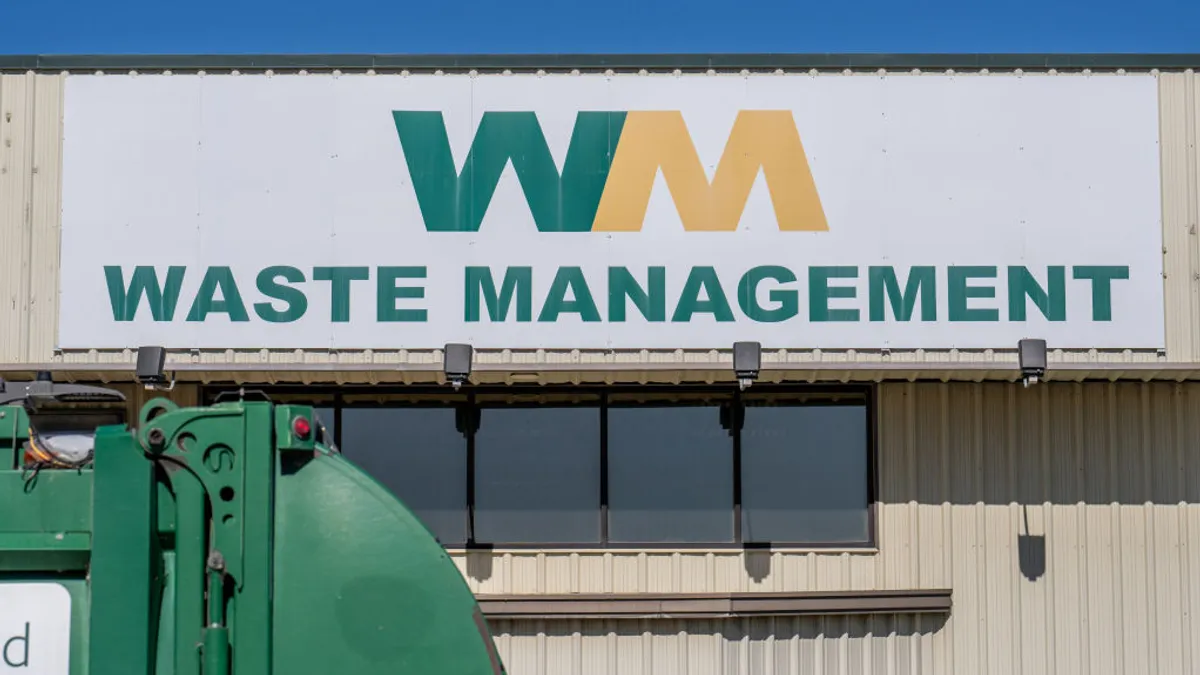Editor’s Note: Waste and recycling are inherently local issues in the United States, and we’re looking for new ways to highlight how these stories fit into broader trends. Send us your tips or feedback at waste.dive.editors@industrydive.com.
Recycling groups seek to gain traction amid infrastructure discussions
Recycling is infrastructure too, say a range of recycling and waste reduction groups. A recently launched campaign is using that tagline in supporting policies and funding that “increase the use of reuse systems, recycled content, and compost products in all infrastructure projects.”
Infrastructure has been on the national discussion radar since the Biden administration unveiled its package in March. While the American Jobs Plan had some implications for the waste and recycling industry, it did not include sections specifically mentioning solid waste, recycling, organics management or zero waste.
“The reason why we did this on a national level was because we didn't think people appreciated what an economic and environmental strategy recycling, composting and reuse can be,” said the Institute for Local Self-Reliance’s Neil Seldman. Despite numerous federal actions on climate this year, “we did not see anyone — any of the bills or any of the discussion — acknowledging that recycling is a fundamental part of that effort.”
ILSR and Zero Waste USA issued a letter to the new administration in March following the American Jobs Plan’s release outlining 12 goals for waste reduction, reuse, recycling and composting. Seldman said that document prompted participation in discussion calls from dozens of stakeholders that now fall under the new infrastructure campaign.
Monthly calls are bringing together voices from the paper, glass and plastics sectors, for example, allowing stakeholders from across the industry to strategize on policy goals before taking next steps in the fall.
“We're hoping to come up with a consensus that we can then send on to the congressional people, as well as the agency people, to make sure that as they put their budgets together under these new bills, that recycling infrastructure is represented,” Seldman said. While the campaign is initially focused on federal policy, he said actions at the state level could be a focus later on.
Organizers noted this latest campaign builds on other recent industry efforts including the U.S. Composting Infrastructure Coalition, Food Waste Action Plan, the Break Free From Plastic group’s recommendations to reduce plastic pollution through congressional stimulus and funding bills, and lastly, The Recycling Partnership’s new investment report which called for $17 billion over five years to make residential recycling as accessible in the U.S. as trash disposal.
The 10 initial organizations officially participating are the American Sustainable Business Council, Biodegradable Products Institute, Container Recycling Inc., GreenEducation.us, Institute for Local Self-Reliance, National Recycling Coalition, South Baltimore Community Land Trust, Baltimore's Zero Waste Coalition, US Composting Council, US Green Building Council – TRUE Program, and Zero Waste USA.
Twin Cities region poised for first major landfill expansion in years
Minnesota aims to hit a 75% recycling rate for the Twin Cities metro area by 2030 and local jurisdictions are in the midst of an ongoing push around organics diversion in that region, but state officials anticipate still needing ample disposal capacity in the near term.
On Tuesday, the Minnesota Pollution Control Agency (MPCA) announced a preliminary determination that four landfills in the Twin Cities area should expand “to accommodate 5.6 million tons of new garbage over the next seven years.” The agency notes an estimated 3.3 million tons of waste are generated in the region each year – an amount that has increased in the past year – and said regional landfills haven’t expanded since the early 2000s.
“We don’t take decisions to expand landfills lightly,” said Kirk Koudelka, MPCA assistant commissioner for land policy and strategic initiatives, in a statement. “Additional capacity is a short-term solution. We are also looking at the long-term, big picture on how to best manage our waste so it does not need to be landfilled.”
The four sites (in order of largest potential expansion) include Republic Services’ Pine Bend Sanitary Landfill, Waste Management’s Burnsville Sanitary Landfill, Waste Connections’ Rich Valley Landfill and a Dem-Con site. The agency also announced a draft environmental review for the Burnsville site, which is seeking an expansion that could extend capacity to approximately 2062.
MPCA is hosting public meetings on these issues this month and also accepting written comments.
More updates from around the country:
-
Labor shortages continue to affect waste collection in multiple states. In Burlington County, New Jersey, a driver shortage is disrupting recycling operations. Likewise, garbage pickups are backed up in Jonesboro, Arkansas. Providence, Rhode Island, has also seen such disruptions; its contractor Waste Management pointed to the industrywide labor challenges. In Dallas, brush and bulk trash pickup have reportedly been delayed by up to 40 days in part due to labor constraints. Columbus, Georgia, is weeks behind on its bulk and yard waste pickup, which it partly attributes to a drop in labor from incarcerated people. But there are signs of improvement in other parts of the country. In Genesee County, Michigan, which has faced disruption throughout the spring, hauler Emterra reportedly said this week it’s “back up to full strength.”
-
That labor hangup is also affecting consideration of new contracts. Rumpke submitted a bid to provide service to Huber Heights, Ohio, but ultimately advised the city council against accepting its bid due to a worsening labor pool and insufficient number of drivers to support the community. The city intends to move forward with Republic Services instead. Conversely, in Fenton, Michigan, the city is breaking ties with Republic for a new contract with GFL Environmental following service disruptions that Republic partly attributed to the labor shortage.
-
Leaders in Savannah, Georgia, unanimously passed a resolution to phase out single-use plastics -- from plastic bags, to cups and utensils, to most food packaging -- from city buildings. (Savannah Morning News)
-
Fort Collins, Colorado, is working to implement an ordinance requiring trash haulers to also provide recycling services to all multi-family and commercial customers. (North Forty News)
-
The South Carolina General Assembly recently passed a law allowing for fines of up to $25,000 for tire recyclers that violate state regulations, following problems with abandoned tire piles. (AP News)



















